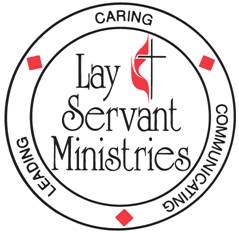Conference Committee on Lay Servant Ministries
The conference committee on Lay Servant Ministries is related to the conference board of laity and fulfills the following responsibilities:
- Provides overall structure and guidance for the training and development of certified lay servants and certified lay speakers;
- Oversees the program of certified lay ministers, including their training and approval;
- Sets criteria and guidelines for district committees on Lay Servant Ministries;
- Develops lay servant courses and approves courses developed by other groups;
- Organizes conference-wide lay servant events.

Committee Membership
Conference Director: Ann Davis, ardavis@nccumc.org
District Directors and Co-Directors
Beacon
Tom Santa, tsanta5721@hotmail.com
Capital
Janet Groberski, jgroberski@nccumc.org
James Bernstein, jbernstein@nccumc.org
Corridor
Vicki Ambrose vambrose@nccumc.org
Allen Burden, ga57burden@gmail.com
Fairway
Pam Strug, pstrug@nccumc.org
Gateway
Effie McGill, effie.mcgill@gmail.com
Harbor
Sandy Core, score@nccumc.org
Heritage
Ken Ripley, ripleykv@twc.com
Sound
TBD
Staff Liaison: Leah Wiebe-Smith, lwiebesmith@nccumc.org
Director of Leadership Development and Christian Formation
Center for Leadership Excellence
